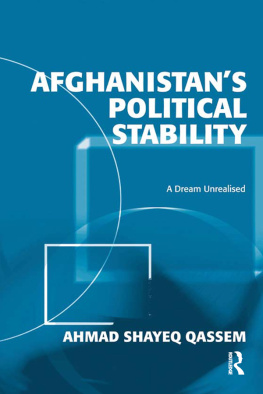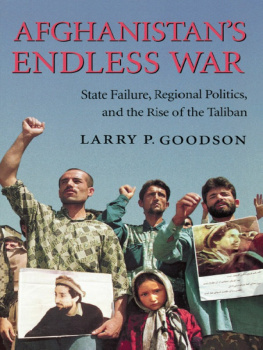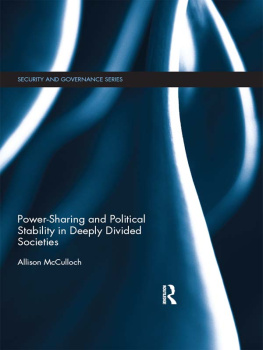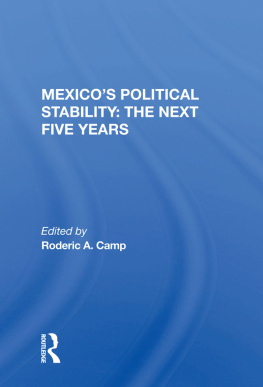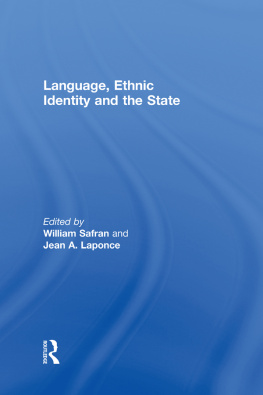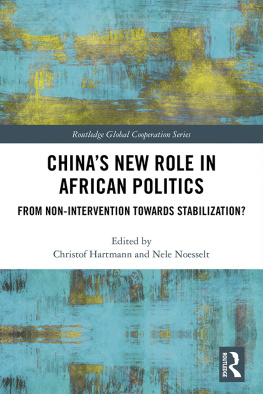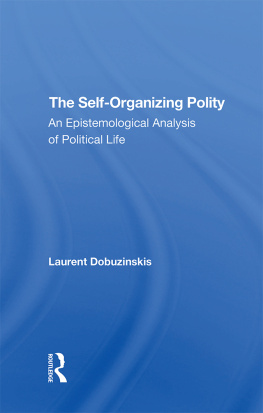AFGHANISTANS POLITICAL STABILITY
Dedicated to my parents who taught me to read and write long before I went to school and made great sacrifices for the well-being of all their children.
Afghanistans Political Stability
A Dream Unrealised
AHMAD SHAYEQ QASSEM
First published 2009 by Ashgate Publishing
Published 2016 by Routledge
2 Park Square, Milton Park, Abingdon, Oxon OX14 4RN
711 Third Avenue, New York, NY 10017, USA
Routledge is an imprint of the Taylor & Francis Group, an informa business
Copyright Ahmad Shayeq Qassem 2009
Ahmad Shayeq Qassem has asserted his right under the Copyright, Designs and Patents Act, 1988, to be identified as the author of this work.
All rights reserved. No part of this publication may be reproduced, stored in a retrieval system or transmitted in any form or by any means, electronic, mechanical, photocopying, recording or otherwise without the prior permission of the publisher.
Notice:
Product or corporate names may be trademarks or registered trademarks, and are used only for identification and explanation without intent to infringe.
British Library Cataloguing in Publication Data
Qassem, Ahmad Shayeq.
Afghanistans political stability : a dream unrealised.
1. Political stability--Afghanistan. 2. Afghanistan-
Foreign relations--Asia, Central. 3. Afghanistan--Foreign
relations--South Asia. 4. Asia, Central--Foreign
relations--Afghanistan. 5. South Asia--Foreign
relations--Afghanistan. 6. Afghanistan--Politics and government.
I. Title
958.104-dc22
Library of Congress Control Number: 2009031865
ISBN 9780754679400 (hbk)
Contents
Preface
Political stability has always been a central theme of policy for all governments and political systems in the history of modern Afghanistan. Since its inception in the mid-nineteenth century, the country experimented with a diverse succession of political systems and state ideologies matched by few other countries political histories. In the span of less than nine decades since independence in 1919, the Afghan state was substantially restructured at least a dozen times. Its official character underwent changes from being a vassal entity of a foreign power to adopt a plethora of successive/simultaneous identities including: a progressive monarchy; a peasant emirate; a conservative monarchy; a republican regime; a communist state; an Islamic state; an Islamic emirate; and finally the current Islamic Republic of Afghanistan. Within these political systems, the governments and ruling elites reformed and readjusted some of their policies so as to make them more conducive to political stability. Yet political stability, at best, remained a dream unrealised in Afghanistan.
Despite the multiplicity of successive changes, elements of continuity can be deciphered in the foreign relations of all the political systems in modern Afghanistan. Some of these constant themes are partly responsible for the chronic instability of the country. The country has had a complex history of relations with its neighbours, particularly, in Central Asia and South Asia. Although its foreign policy orientations have fluctuated between friendship and tension with bordering nations, it has rarely been on good terms with both regions simultaneously. The nature of Afghanistans relations with Central and South Asia is one of the most important factors that impact on the political stability/instability of the country. Meanwhile, the domestic politics of Afghanistan influence its relations with the neighbours. In order to understand the imperatives of long-term stability in the country sufficiently, a holistic approach to the study of both the concept of political stability and the interactive nature of the relevant endogenous and exogenous factors is needed. A repeated failure by the Afghan governments and their various major-power patrons to grasp the need for implementation of a holistic approach is largely responsible for the chronic instability of the country.
Acknowledgements
In writing and preparing this book, I have had the privilege of being helped by a long list of friends, colleagues and acquaintances both in Afghanistan and abroad. There are some whose names I cannot fail to mention, however. First, I am greatly indebted to three imminent experts in the field, Prof. Amin Saikal, Prof. William Maley and Dr Kirill Nourzhanov. Had it not been for these gentlemens advice and encouragement, the manuscript would not have materialized. The following individuals have also helped me greatly in various ways and I am very thankful to them: Prof. Nazif Shahrani, Prof. Samina Yasmeen, Mahmoud Saikal, Richard Scrivener, Hamish McGregor, Dr Matthew Gray, Dr Hossein Moghaddam, Leila Kouatly, Kerry Pert, Carol Laslett, Helen Parrott, Gary Parrott, Mujib Rahimi, Anita Mack, Daoud Yaqub, Dr Douglas Sturkey, Dr Mehdi Ilhan, Mohammad Zaher, Abdul Razaq Bakhshi, Ahmad Shakeb Bakhshi, Ahmad Hasib Qasemi, Ahmad Hanif Qasem, Nabila Wahed, Qudsia Kabir, Muslima Abdulfatah, Muhsina Nasir, Benafsha Qasemi, Col. Abdul Ghani, Kamela Amri, Dr Abdulwahab Ghani, Sahar Salim, Said Moladad, Fawad Muslim, Saif Aslami, Sayam Sediqyar, Torialai Rastar, Shawali Walizadah and Yalda Monshizadah.
I am also grateful to my former colleagues and friends at the Afghan Ministry of Foreign Affairs and other government ministries and agencies and foreign diplomats in Kabul who kindly agreed to be interviewed. I have acknowledged the names of many of them in the footnotes and honoured the wishes of those who wanted to remain anonymous.
A word of thanks is due to my publishers and the associated staff including Pauline Beavers, Kirstin Howgate, Jude Chillman, Margaret Younger and Jonathan Hoare for their patience and excellent work in seeing the book through to publication.
I am very privileged to have enjoyed the unremitting support and encouragement of my loving parents Col. (Ret.) Abdul Fatah Qassem and Jamila Qassem, brothers, sisters and the extended family in Afghanistan and abroad throughout my life and particularly in undertaking the project for this work. My family has been a bedrock support to everything that I have accomplished in my life.
Finally, I have reserved my special thanks to Frechta, my caring wife and the mother of my two lovely daughters Safa and Sarah, for her encouragement, support and gracious resilience in enduring my extremely busy time when I had to combine full-time work with research and writing.
Introduction
Stability in Afghanistan has eluded the Afghans as well as many concerned foreigners most of the time since the consolidation of the modern Afghan state in the mid-nineteenth century. The countrys history is replete with long but intermittent periods of instability that alternated and diluted the achievements of each period of relative calm in which the inhabitants of this region tried hard to rebuild their lives. In ancient eras, marauding invaders traversed its territory from all directions many times over, leaving a trail of unsettling consequences that altered its established patterns of relations and disrupted its stability. Equally, Afghanistan produced its own conquerors that raided the surrounding regions and built great empires centered in the territory of what came to be known as Afghanistan in modern times.
Following the advent of British and Russian colonialism in South and Central Asia from the mid-eighteenth century, the people of Afghanistan had to fight at least three major wars against Britain and many skirmishes with both Britain and Russia in what most of the Afghan historians have termed as a struggle for independence. Yet after Afghanistans independence in 1919 and the decolonization of both Central and South Asia, the countrys stability still continued to be fragile.

